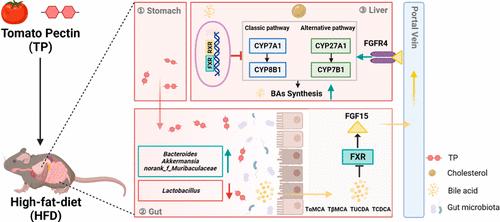当前位置:
X-MOL 学术
›
J. Agric. Food Chem.
›
论文详情
Our official English website, www.x-mol.net, welcomes your
feedback! (Note: you will need to create a separate account there.)
Tomato Pectin Ameliorated Hepatic Steatosis in High-Fat-Diet Mice by Modulating Gut Microbiota and Bile Acid Metabolism
Journal of Agricultural and Food Chemistry ( IF 5.7 ) Pub Date : 2024-06-10 , DOI: 10.1021/acs.jafc.4c01598 Pan Wang 1 , Jing Sun 1, 2 , Wenting Zhao 1 , Dan Wang 1 , Yue Ma 1 , Yuanyuan Zhao 1 , Yubin Wang 1 , Xiaoyan Zhao 1, 2
Journal of Agricultural and Food Chemistry ( IF 5.7 ) Pub Date : 2024-06-10 , DOI: 10.1021/acs.jafc.4c01598 Pan Wang 1 , Jing Sun 1, 2 , Wenting Zhao 1 , Dan Wang 1 , Yue Ma 1 , Yuanyuan Zhao 1 , Yubin Wang 1 , Xiaoyan Zhao 1, 2
Affiliation

|
Nonalcoholic fatty liver disease (NAFLD) is a worldwide public health issue. Changes in the gut microbiota structure and composition are closely related to host pathophysiology processes. Pectin is associated with several beneficial health effects. In the present study, we aimed at investigating the effect of tomato pectin (TP) on hepatic steatosis and exploring the underlying mechanisms by focusing on the regulation of the gut microbiota-bile acid axis. Our results showed that TP attenuated high-fat diet (HFD)-induced liver steatosis and inflammation. TP administration increased the diversity of gut microbiota, enhancing the abundance of beneficial bacteria and suppressing the abundance of harmful or conditional pathogenic bacteria. Further antibiotic-caused microbiome depletion confirmed that the anti-NAFLD activities of TP were dependent on the regulation of gut microbiota. Besides, TP intervention affected feces bile acid metabolism and caused significant changes in functional conjugated bile acids, which in turn inhibited the ileum FXR/FGF15 signaling, leading to stimulation of the hepatic bile acid (BA) production. Furthermore, TP treatment accelerated BA excretion, promoted BA transportation, inhibited BA reabsorption, and facilitated cholesterol efflux to relieve HFD-induced hyperlipidemia. These findings provide a potential dietary intervention strategy for TP against NAFLD via modulation of cross-talk between BAs and gut bacteria.
中文翻译:

番茄果胶通过调节肠道微生物群和胆汁酸代谢改善高脂肪饮食小鼠的肝脏脂肪变性
非酒精性脂肪肝(NAFLD)是一个世界性的公共卫生问题。肠道菌群结构和组成的变化与宿主的病理生理过程密切相关。果胶具有多种有益健康的作用。在本研究中,我们旨在研究番茄果胶(TP)对肝脏脂肪变性的影响,并通过关注肠道微生物-胆汁酸轴的调节来探索其潜在机制。我们的结果表明,TP 可以减轻高脂饮食 (HFD) 引起的肝脏脂肪变性和炎症。 TP 给药增加了肠道微生物群的多样性,增加了有益细菌的丰度,并抑制了有害或条件致病菌的丰度。抗生素引起的微生物组耗竭进一步证实,TP 的抗 NAFLD 活性依赖于肠道微生物群的调节。此外,TP干预影响粪便胆汁酸代谢,引起功能性结合胆汁酸的显着变化,进而抑制回肠FXR/FGF15信号传导,从而刺激肝胆汁酸(BA)的产生。此外,TP治疗可加速BA排泄,促进BA运输,抑制BA重吸收,促进胆固醇外流,从而缓解HFD引起的高脂血症。这些发现通过调节 BA 和肠道细菌之间的相互作用,为 TP 对抗 NAFLD 提供了一种潜在的饮食干预策略。
更新日期:2024-06-10
中文翻译:

番茄果胶通过调节肠道微生物群和胆汁酸代谢改善高脂肪饮食小鼠的肝脏脂肪变性
非酒精性脂肪肝(NAFLD)是一个世界性的公共卫生问题。肠道菌群结构和组成的变化与宿主的病理生理过程密切相关。果胶具有多种有益健康的作用。在本研究中,我们旨在研究番茄果胶(TP)对肝脏脂肪变性的影响,并通过关注肠道微生物-胆汁酸轴的调节来探索其潜在机制。我们的结果表明,TP 可以减轻高脂饮食 (HFD) 引起的肝脏脂肪变性和炎症。 TP 给药增加了肠道微生物群的多样性,增加了有益细菌的丰度,并抑制了有害或条件致病菌的丰度。抗生素引起的微生物组耗竭进一步证实,TP 的抗 NAFLD 活性依赖于肠道微生物群的调节。此外,TP干预影响粪便胆汁酸代谢,引起功能性结合胆汁酸的显着变化,进而抑制回肠FXR/FGF15信号传导,从而刺激肝胆汁酸(BA)的产生。此外,TP治疗可加速BA排泄,促进BA运输,抑制BA重吸收,促进胆固醇外流,从而缓解HFD引起的高脂血症。这些发现通过调节 BA 和肠道细菌之间的相互作用,为 TP 对抗 NAFLD 提供了一种潜在的饮食干预策略。






























 京公网安备 11010802027423号
京公网安备 11010802027423号